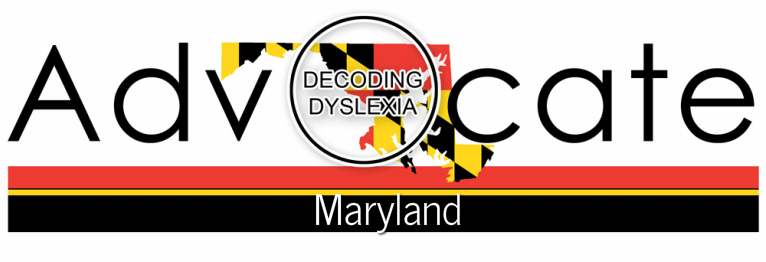
Research shows that 95% of kids who read below grade level can learn to read well and avoid the special education system if they are:
- Identified early (K-2 grade)
- Receive evidence-based reading interventions EARLY (K-2nd grade)
- Instructed with fidelity using a well trained teacher in a 1:1 or very small group environment
Although the public school system in Maryland has programs available to teach students with language learning disabilities like dyslexia, parents must know to ask for these programs and learn how to access them through the special education process. Parents with time and money can research and purchase the necessary interventions for their children. Parents without time and money don’t often have the luxury to supplement their child’s public school education to provide interventions that their children need to learn.
Maryland does not recognize dyslexia even though it is a well-researched disability under Specific Learning Disability in Federal law and in State Education Code. Maryland public schools are legally bound to provide students with a free and appropriate public education. Over the years we’ve paid more than $40,000 out of pocket to provide tutoring for Catherine to help her keep up with grade level demands. If she had been identified with dyslexia early and been provided the appropriate multi-sensory, structured language intervention she needed, we might not be telling this story now. When interventions are delayed until 3rd grade and beyond, approximately 74% of students will continue to have difficulties learning to read through high school (American Academy of Pediatrics, 2011).
In the fall Catherine will be freshman in high school – she’s received special education services since Kindergarten and yet still struggles to read and write. Catherine and others like her spin their wheels in a special education system that cannot close the learning gap and continues to throw good money after bad. Catherine has many strengths on which she will rely including math, big picture thinking, common sense, good humor, friendliness and swimming. She loves to read and write and uses technology to meet the demands of school.
Decoding Dyslexia Maryland (DD-MD)
Lisa Blottenberger, Mary Ann Tomasic and I (Laura Schultz) organized Decoding Dyslexia Maryland because we were concerned with the limited access to educational interventions for dyslexia and other language based learning disabilities within our public schools. We also were inspired by Decoding Dyslexia New Jersey and their successes in New Jersey.
Our goals, like the 45 other Decoding Dyslexia states, is to raise dyslexia awareness, empower families to support their children and inform policy-makers on best practices to identify, educate and support students in MD public schools. We hear from parents daily who are frustrated by their student’s lack of progress in public school – they are looking for answers and solutions. Parent stories are almost identical no matter where they reside in the state.
Kids with dyslexia often “drop out” of the public school system and either home school, find a private school or find private tutors to teach their children to read and write. This is not free, it’s not appropriate and it’s not right; especially for families who cannot afford these measures and for military families who cannot afford the time and effort to re-educate educators in state after state.
Decoding Dyslexia MD has 5 policy goals that many other Decoding Dyslexia states have successfully enacted. Most recently, New Jersey, Connecticut, Illinois and Pennsylvania adopted dyslexia laws.
Decoding Dyslexia: Five Steps to Literacy
1. Identify dyslexia early in public schools
2. Provide appropriate evidence based interventions know to work for students with dyslexia
3. Define dyslexia in education code and in federal I.D.E.A. statutes
4. Provide appropriate accommodations and assistive technologies and, most importantly,
5. Require pre-and-post-service teacher education that meets the International Dyslexia Association’s Knowledge & Practice Standards for Teachers of Reading.
How You Can Help Change Public Education in Maryland
If you or a family member, or a friend, has dyslexia, please let them know they can join DD-MD and help change our state laws: JOIN DD-MD . If you don't live in Maryland and would like to help out, check the national Decoding Dyslexia website and find your state and join their efforts! DD-USA
Another way to help is to contact Members of Congress in Maryland and ask that they co-sponsor House Resolution 456. “The House of Representatives calls on schools and State and local educational agencies to recognize that dyslexia has significant educational implications that must be addressed.”
Catherine and I, and all of DD-MD, will take the opportunity this week to ask our Maryland elected officials in Washington to support this resolution.
Please help DD-MD spread the word so we can help students with dyslexia learn to read and write!
Thank you,
DD-MD Parent Leaders
Laura Schultz, St. Mary’s Co.
Mary Ann Tomasic, St. Mary’s
Lisa Blottenberger, St. Mary’s, Calvert
Michelle Nebel, Charles Co.
Jaclyn Paris, Harford, Cecil, Baltimore Co., Eastern Shore
Edith Boteler, Prince Georges Co.
Melody Friend, Garrett, Allegheny Co., Western Maryland
Rachael Aiello, Howard Co.
Carrie Levine & Tiffany Audas, Montgomery Co.
DecodingDyslexiaMD@gmail.com


 RSS Feed
RSS Feed